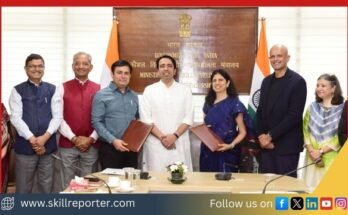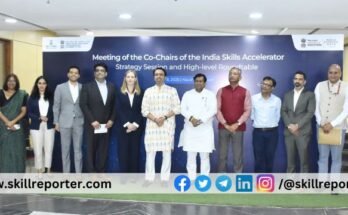The Centre has decided to set up an Indian Institute of Skills in every State and take up in a big way ‘certification’ of passion-driven skills of those like carpenters, iron-smiths and agriculturists among others both to augment their livelihood opportunities and enable them become entrepreneurs.
At the same time, the Centre has asked the Union Public Service Commission (UPSC) to initiate recruitment under the new Indian Skill Development Service (ISDS), aimed at attracting young and talented administrators who would strengthen and modernize the skill ecosystem in line with the current scientific and industrial development in the country.
ISDS is a Group ‘A’ service (along the lines of All India Civil Services) where induction for the total 263 all-India posts will take place through Indian Engineering Service Examination, conducted by the UPSC. ISDS, notified last year, is the brainchild of the Ministry of Skill Development and Entrepreneurship (MSDE), which is simultaneously “planning big, through small” envisaging that even a housemaid could be ‘skilled’ and an ironsmith could be ‘certified’.
“After Prime Minister Narendra Modi laid the foundation stone of Indian Institute of Skills in Kanpur (in December 2016), we had planned to open four more such institutes of excellence. But now, we have decided to scale up the project by hoping to open one such institute across all the states,” said Minister of State for Skill Development & Entrepreneurship Ananthkumar Hegde.
With the help of certificates even in traditional family trades where people may already have the skills, they will be able to secure jobs even in foreign countries, Hegde pointed out adding his Ministry’s special focus is in rural areas and low-end jobs.
Amid criticism of lack of job opportunities, Hegde asserted, “Job creation was never our mandate. Ours is for skill certification. We are now expanding our technological platform to include data on people who get certificates and then take up jobs. We will be able to track where they have been employed,” Hegde added.
The Ministry is giving recognition to prior-learning of trades like ‘lohar’ (ironsmith), carpenter, agriculturists – possessing passion-driven skills, which would be recognized by the Government, he said and insisted that the Government has set into motion the process of creating a massive training infrastructure across India to institutionalize ‘certification’.
“Through the training of ‘Lohar’ we would identify his knowledge on metallurgy and to what level on the scale of one to ten, he is to be certified. Wo kaamgaar bhi hoga aur entreprenueur bhi,” Hegde said adding “he does not have to learn, we have to learn from him.”
“We are working at low-end skill training in short-term training centres. We have more than 27 such training institutes in the country as long-term courses in Information and Technology, agriculture etc are more expensive,” he said.
As of now, there are eight Skill/Vocational Institutes/Universities functioning outside the purview of the UGC. “These institutes are planned with private sponsorship. But where we don’t get one, the Government will invest its own money,” said Hegde, who took charge of the three-year-old Ministry in September, last year and keeps a close watch on one of Modi’s pet projects.
Hegde said the focus is to create infrastructure in public private partnership mode. “Even in case of universities that are being set up, the Ministry plays a regulatory role. We will formulate the curriculum and other related procedures, while the rest will be handled by the partner agency. MSDE has also tied up with the HRD Ministry,” he added.
Admitting that there were enormous skills but not recognized by the government, he said, “We did not recognize skills of those like who construct buildings. We have only 4.8 percent of skilled manpower compared to 60 percent in developed countries. India is seen unskilled though we are skilled. Things are changing now. We will bring India up in the skill index.”
“We will now give certificates to these skilled manpower which can go abroad equipped with such technical certification. In the Gulf and Scandinavian countries such skilled workers and manpower is needed. We can export manpower at lower level. House maids could also be skilled,” he said.
The Ministry is also going to set up a Nirvana fund to help nano entrepreneurs. Under this scheme, funds up to Rs 2.5 lakh will be given without any collateral being taken. “We will help fund entrepreneurs in the fields of tourism, plumbing, constructions, health and other fields,” Hegde said.
According to Government figures, out of 2.5 crore candidates who have been skilled under the Ministry programmes, more than one crore were trained in 2017. The Ministry has been focused on building industry standardized infrastructure for driving skill development training through Pradhan Mantri Kaushal Vikas Kendras (PMKVK). By last count, 527 such Kendras were allocated across 27 States covering 484 districts and 406 parliamentary constituencies.
Note: News shared for public awareness with reference from the information provided at online news portals.



